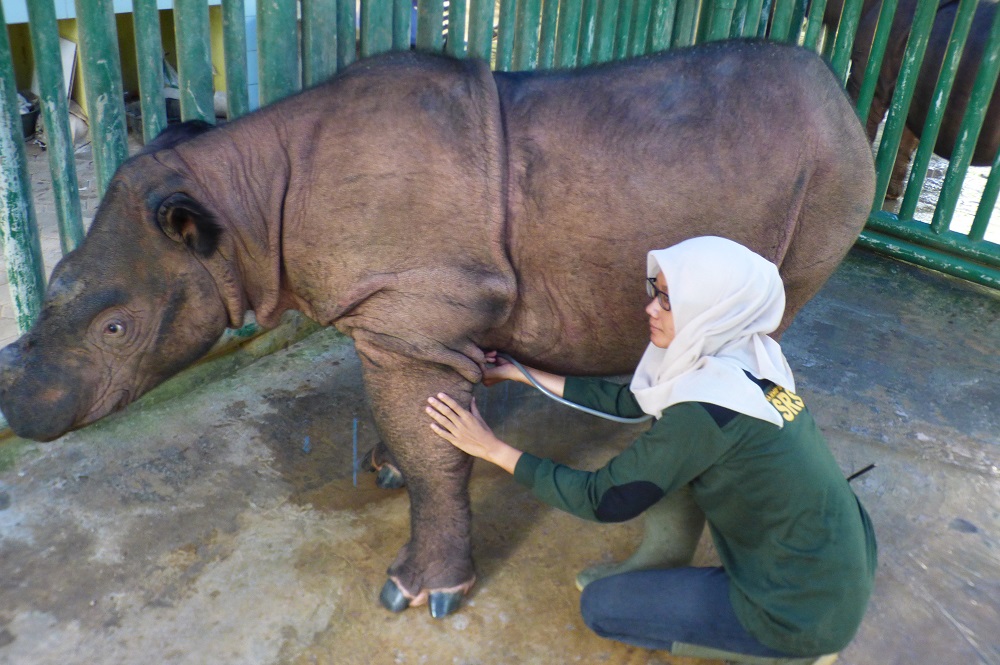Written by Kelly Russo, Communications Manager, International Rhino Foundation.
The Sumatran rhino is so rare that even scientists and rangers who’ve dedicated their lives to their protection have often never seen one in the wild. There are now thought to be fewer than 80 individuals, scattered across 10 small subpopulations. Opportunities for breeding are rare.
The Sumatran Rhino Sanctuary (SRS) on the island of Sumatra is the only breeding facility in the world dedicated to the breeding of and research into the world’s most endangered land mammal. We sat down with one of the newest members of the team, Dr Agvinta Nilam, a 26 year-old veterinarian, to learn more about what it’s like being a vet at the SRS.
Q: What inspired you to become a wildlife veterinarian?
A: I’ve always thought that being a wildlife vet would be the best job in the world. During my veterinary studies at Bogor Agricultural University, I joined a wildlife interest group, which sparked my interest and awareness of the endangered species of Indonesia. I decided to find a way to make a difference and contribute to wildlife conservation here in Indonesia.
Q: How did you get this job?
A: Social media! I saw it online in early 2017 and I knew it would be difficult but important work. At the time, I had only seen pictures of Sumatran rhinos. After applying, Mr Sumadi, the SRS Manager, asked me to visit the breeding facility before the interview. I’ll never forget him saying to me, “You must know what it’s really like, because the SRS is very special place, unlike any place on earth”. And he was right! The SRS is an incredible place with amazing animals.
Q: What most surprised you about the work?
A: Everything! I get to work with the most critically endangered species in the world. The SRS is the only place in the world where scientists can learn all about these animals. Now I’m here, I’m determined to learn as much as I can about Sumatran rhinos and to fight for their survival.
Q: What’s the hardest part of your job?
A: It’s very isolated, being in the middle of Way Kambas National Park. There is no mobile phone service here, so it is difficult to keep in touch with friends and family.
Q: What’s the best part of your job?
A: Watching Delilah grow up is my favourite part of my job. I’ve totally fallen in love with her. And now she’s even bigger than her Mom, Ratu, and that makes me very happy. It’s also exciting working to get Rosa pregnant. She’s had several miscarriages, but we’re working with top vets from around the world to adapt her care so that, hopefully, she’ll carry a pregnancy full-term.
Q: What do your friends and family think about your work?
A: My family thinks working with wild animals is dangerous. It was hard to ask for permission from my family to work here – especially from my mom. But I’ve always said to her that working with wild animals is my passion. Now my family is proud of what I do and they understand that working with them takes a lot of dedication. My friends think that my job is very cool and challenging. I mean, I do get to stay 24/7 in the jungle, with no mobile service and I get to work with the world’s most critically endangered land mammal!
Q: What’s it like to live at the SRS?
A: The people here are like my family. We laugh together, we’re sad together – we do everything together! It is such a great team. Mr Sumadi, the SRS Manager, is like my father here at the SRS. He’s taught me everything I know and he’s the best teacher – he’s the one who built this place! Mrs Siti, the camp cook, is like my mom, always taking good care of me.

Q: What do you most want people to know about Sumatran rhinos?
A: I really want people know how rare the Sumatran rhino is – there are fewer than 80 animals left. It’s time to worry and to fight for their survival! Sumatran rhino conservation is not easy; we need support from as many people as possible. I hope readers continue to talk to their friends and family about this amazing species and increase awareness. I also want to thank everyone for their support. Thanks to them, the SRS is successfully breeding Sumatran rhinos. We’re excited to expand our operations here and hope to have many more rhino babies in the near future.
A version of this article was originally printed in The Horn 2018.









